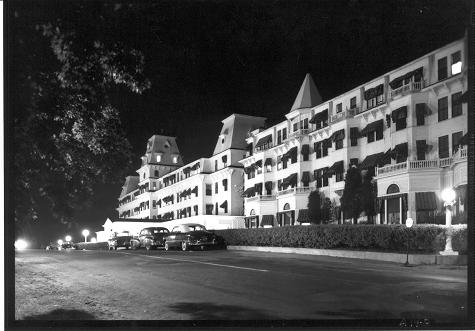| Integrating the Wentworth in 1964 |

WITNESS TO HISTORY
Portsmouth Black Heritage Trail
Jean Potter was there on July 4, 1965 when civil rights activists finally broke the color barrier at the formerly exclusive Wentworth by the Sea Hotel in New Castle, New Hampshire. Here is her memory of the event, exclusively on SeacoastNH.com.
How the Wentworth Hotel was Integrated
A report by Jean Potter for SeacoastNH.com
Seacoast Black HIstory
SEE: Celebrating 40 Year After Civil Rights Action at Wentworth Hotel
SEE: "Guess Who Came to Dinner" by JD Robinson
The date: July 4 1964
The location: Wentworth-by-the-sea Hotel
The intention: To ensure the mandate of the federal Civil Rights Commission regarding legal acceptance of accommodations, regardless of race, color, or creed.
The participants: A black Portsmouth, NH married couple, a white University professor and wife with back-up at the hotel of NAACP Board members on call should help be necessary, as this was a test case.
The organization for this planned event: Board members of the seacoast chapter of the NAACP who planned the evening to ensure the rights of any person to be served in the main dining room of the Wentworth Hotel. Not yet ever to have happened.
The Seacoast Board at this time, early 1964, started a many-pronged effort to secure equal rights for the black population. The effort involved, well planned and executed testing of barber shops, housing, employment, etc. any area where discrimination was being practiced. The Board spent many hours to make sure that we were prepared and to do so in a civil and legal manner.

The story: July 4th was chosen in advance for this particular test as it was to be a major gala evening, to be hosted by the owner, himself, and proved to be a full house. Our reservations were made in advance in my husband’s name and made for four persons.
 The owner greeted us on the porch and suggested we might like a table overlooking the ocean. I used the excuse that I had just had my hair set and preferred to be in the main dining room. It was important that we actually enter the hotel. My husband paid, in advance, the set fee for four dinners and received his receipt. Our server gave us water, rolls, and butter. And then my husband was asked to see the owner. The black couple arrived and were denied access to the table.
The owner greeted us on the porch and suggested we might like a table overlooking the ocean. I used the excuse that I had just had my hair set and preferred to be in the main dining room. It was important that we actually enter the hotel. My husband paid, in advance, the set fee for four dinners and received his receipt. Our server gave us water, rolls, and butter. And then my husband was asked to see the owner. The black couple arrived and were denied access to the table.
The matter was discussed in the owner’s office, at which time he said, “You didn’t tell me your guests were black.” Answer, “No, nor did I tell you I was Scotch-Irish.” He asked why my husband didn’t go back to Africa with all the others.
Three people came to my table and asked me to leave. Time was adding up, so I did leave and joined the other wife in the lobby.
We had arrived at 7 pm. At 9 pm we were seated and served dinner. The turning point was the receipt and the owner knew he was in violation of the civil right accommodations act.
The irony was that -- beside our table on a large serving table -- was the American flag, designed out of dinner mints. And guests had been encouraged to see it and help themselves. So we were not overlooked!
The following weekend a second test was run, involving a black Lt. Col. from Pease Air Base. And the scene once again replayed, but with no delay. The color line was broken!
Along with this effort testing was ongoing in the seacoast area. In February I testified before a visiting Federal Civil Rights Commission on discrimination in employment and housing. My husband’s case involved a denial of a hair cut for a black. This case went to court and the case won in favor of the black.
In those days, the board was made up of individual whites, individual blacks, married couples, and interracial couples, clergy and a rabbi. People who early-on wanted to right the injustices imposed on a race. In time that humiliation, the reluctance to enter new areas known to be of denial was broken down. My own role on the board ended when the local chapter was staffed with local black population, and we needed to step back. For those in that time period, you can imagine what hard planning, (heretofore not done) was needed to make these rights legally available.
By Jean Potter, wife of Hugh Potter of the UNH English Department
For more on this historic even:
READ: Black Portsmouth
READ: Wentworth by the Sea: Life & Times of a Grand Hotel
